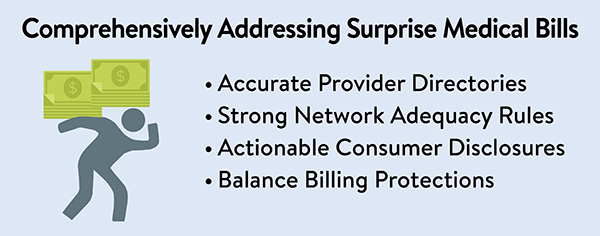Addressing Surprise Medical Bills: Resources
Unexpected or “surprise” medical bills are a common healthcare affordability burden and can cause considerable consumer harm. A 2018 Consumer Reports survey found that nearly 1/3 of Americans have received a surprise medical bill—and that most don’t know where to turn to correct errors or get help. A 2018 Kaiser Family Foundation poll found that 67 percent of people worry about unexpected medical bills, more than they feared insurance deductibles, prescription drug costs or paying for the basic staples of life: rent, food and gas.
Surprise medical bills can take many forms: charges higher than expected; bills from unexpected doctors; or bills from out-of-network providers working in in-network facilities. In the latter case, consumers can be subject to “balance billing” if the out-of-network provider will not accept the amount an insurer thinks a procedure or test should cost.
States around the nation are taking a close look at these issues, particularly in situations where patients received an unexpected bill from an out-of-network provider through no fault of their own.
Advocates and policymakers should protect consumers from Surprise Medical Bills but also use the dialog to discuss reasons for high billing prices more generally.

Resources
Surprise Medical Bills
- Improve Provider Directories
- Network Adequacy Protections
- Better Disclosure While Insurance Shopping: Texas Advocates Made Use of a State Reporting Requirement to see how often in-network hospitals don’t feature in-network ER docs.
Balance Billing Protections
- NASHP: State Legislators Take Action to Protect Consumers from Surprise Billing (September 2018).
- Commonwealth Fund: Balance Billing by Health Care Providers: Assessing Consumer Protections Across States (June 2017).
- The Georgetown University Health Policy Institute, Center on Health Insurance Reforms. Balance Billing: State Efforts to Protect Consumers from Balanced Billing (January 2019).






